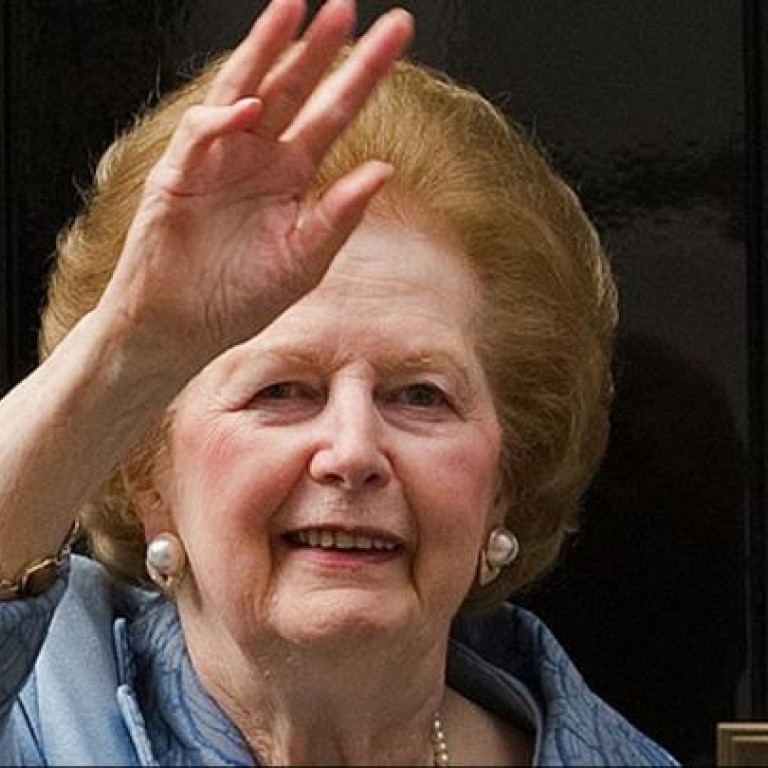
Iron Lady quickly ditched her principles if politics demanded
Margaret Thatcher was not afraid of executing policy U-turns when it came to economic doctrine and avoiding some damaging headlines
The thousands of articles published in the past couple of days about Margaret Thatcher, the former British prime minister who died on Monday, fall into two camps.
There are the adoring hagiographies of the right which venerate her for revitalising Britain's moribund economy.
And then there are the condemnatory philippics of the left, which denounce her for the high social cost of her economic agenda and accuse her of breaking up long-established communities.
Few on either side, however, seem to doubt either the effectiveness of her economic policies, or her steadfast adherence to her political principles, typified by her famous declaration "the lady's not for turning".
That's curious because for the first two years of her government, from May 1979 to April 1981, most people in Britain and many members of Thatcher's own Conservative Party, agreed that her monetarist economic policies were an unmitigated disaster.
It was only a stunning U-turn two years into her first term that saved her premiership from the sort of internal party putsch that eventually deposed her in 1990.
Thatcher came to power in 1979 a believer in the monetarist doctrine that controlling the growth of money supply would bring down Britain's chronically high inflation, boosting growth and lowering the unemployment rate.
Benchmark interest rates were duly jacked up from 12 to 17 per cent. But things didn't work quite as Thatcher and her advisers had hoped. Consumer inflation continued to mount, climbing from 10 per cent when she took power, to 22 per cent a year later.
Meanwhile, high interest rates crushed growth. During 1980, Thatcher's first full year in power, the British economy contracted by 2 per cent, while unemployment shot up from 5 per cent to 8 per cent. Worse, Thatcher failed in her pledge to get a grip on public spending, and the government's deficit soared.
The general feeling was that Thatcher's monetarist policies had made things worse, not better, for Britain's ailing economy, and her party began casting round for a new leader.
In response, Thatcher's finance minister, Geoffrey Howe, executed a U-turn in his 1981 budget that took everyone by surprise. Abandoning strict monetarism, he cut interest rates, simultaneously jacking up taxes in order to plug the gap in the government's finances.
The result was howls of outrage from both sides of the political fence. The monetarists said the rate cut would exacerbate inflation, while 364 prominent economists - including the current governor of the Bank of England - signed a letter to complaining that the government's policies would "deepen the depression, erode the industrial base of our economy and threaten its social and political stability".
Economists still argue whether they were right. But whether it was because the U-turn restored faith in government finances, or because of the groundwork laid by the policies of the previous two years, inflation abated and growth began to recover.
Monetarist doctrine was quietly abandoned in favour of something that looked a lot like old-fashioned economic liberalism, and Britain's economy largely profited.
A conviction politician Thatcher may have been but, in her early days at least, she clearly understood the political benefits of ditching her principles for a smartly executed about-turn.
Thatcher also showed the flexibility of her principles when dealing with Hong Kong.
Today many people praise her for securing a good deal for Hong Kong's people with the Sino-British joint declaration of 1984, which governed the terms of the 1997 handover.
In reality, however, Thatcher had thrown away her best trump card before the negotiations even began.
In 1981, her government passed the British Nationality Act, introducing a new class of British citizen and denying the right of abode in Britain to those, like the majority of Hong Kong's population, who were merely British subjects.
Years later, asked one senior member of Thatcher's first cabinet why she had undermined her own negotiating position in this way. He answered that at the time Britain could not possibly have accepted mass immigration from Hong Kong.
But, protested , the actual number of migrants would have been small. Guaranteed the right of abode in Britain, Hongkongers would have felt secure at home, and London could have got an even better deal for them in Beijing.
Yes, admitted the former minister, but that's not how the British newspapers would have portrayed it. There was no way, he said, we were going to risk headlines in the London press warning that three million Hong Kong Chinese were heading towards British shores. It would have been political suicide.
Even the Iron Lady, it seems, was quick to sacrifice some principles to avoid a damaging headline.

